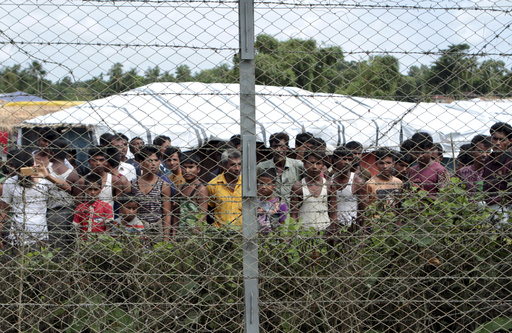
The United Nations has raised alarm over the potential for acute famine in Myanmar’s Rakhine state, a region troubled by conflict involving government forces and powerful ethnic military groups, as detailed in a recent report by the U.N. Development Program (UNDP). Released on Thursday, the report warns that Rakhine is teetering on the edge of a significant humanitarian crisis, which the agency describes as “a perfect storm.”
According to the UNDP, a series of interconnected issues are contributing to this dire situation. These include stringent restrictions on the movement of goods within Myanmar and from neighboring Bangladesh, a lack of income opportunities for the local population, rampant hyperinflation, a decline in food production, and a shortage of essential services and social safety nets. The report emphasizes that this vulnerability threatens to escalate dramatically in the coming months.
Historically, the Rohingya, a Muslim minority, have faced deep-seated discrimination in the predominantly Buddhist nation. Considered by many in Myanmar as “Bengalis,” the Rohingya have been effectively stripped of citizenship since 1982, despite many having resided in the country for generations. The situation worsened dramatically after attacks by a Rohingya militant group in August 2017, which led to a fierce military crackdown, resulting in over 740,000 Rohingya fleeing to Bangladesh. The military’s actions have been widely condemned internationally for allegations of mass violence, including rape and the destruction of homes.
Following the military coup in 2021 that ousted Aung San Suu Kyi’s elected government, pro-democracy guerrilla forces and ethnic armed groups have been striving to reclaim power. Notably, last November, the Arakan Army—which is fighting for greater autonomy—launched an offensive against the military and has gained control over a significant portion of Rakhine, further complicating the situation.
The UNDP underscores the devastating impact of the ongoing conflict on Rakhine’s economy. Data collected for the years 2023 and 2024 reveal a near-total paralysis of key economic sectors such as trade, agriculture, and construction. The report indicates that blockades have rendered both domestic and international markets inaccessible, leading to a collapse of livelihoods as individuals lose income-generating opportunities.
Additionally, the halt in cement imports has caused construction costs to soar, which has crippled one of the region’s major employment sectors. The report, titled “Rakhine: A Famine in the Making,” suggests that the area is on the brink of acute famine, with projections indicating that local food production will meet only 20% of the population’s needs by March to April 2025.
The UNDP attributes the plummeting food production to several factors, including shortages of seeds and fertilizers, adverse weather, a substantial rise in displaced individuals unable to cultivate land, and ongoing violence. This situation, compounded by trade stoppages, risks leaving over two million people facing starvation.
In light of these findings, the UNDP has urgently called for immediate measures to facilitate the delivery of goods and humanitarian assistance into Rakhine. The agency demands unrestricted access for aid workers and heightened safety measures, alongside financial support necessary for the agricultural sector to rebuild.
The report concludes with a stark warning, stating that without prompt intervention, a staggering 95% of the population could be forced into survival mode as they contend with reduced food production, soaring prices, increased unemployment, and escalating insecurity. The UNDP remarked that with trade routes shut down and severe restrictions on humanitarian aid, Rakhine is at risk of becoming an isolated zone plagued by profound human suffering.
